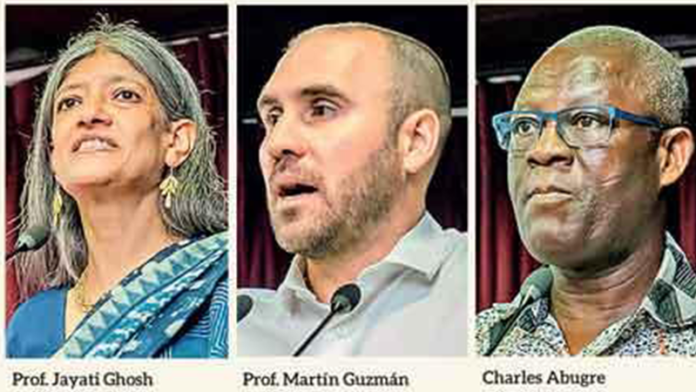June 13, Colombo (LNW): The economic reforms imposed by the International Monetary Fund (IMF) disproportionately affect ordinary citizens, small and medium-sized enterprises (SMEs), and particularly women from low-income backgrounds, eminent economists warned.
During a public seminar titled “Is There Another Way? Debt Restructuring, IMF and Future of Sri Lanka,” Indian economist and International Development Economics Associates (IDEAs) co-founder Prof. Jayati Ghosh articulated these observations.
The event, organised by the ‘YUKTHI Collective’ coalition of civil society organisations and independent academics, aimed to ensure that Sri Lanka’s debt restructuring process respects public rights.
Prof. Ghosh, hailing from the University of Massachusetts, Amherst, USA, and former Professor at Jawaharlal Nehru University, New Delhi, India, argued that despite political assertions that Sri Lanka has no alternative to the IMF, numerous options exist to address the financial crisis, with examples worldwide.
Advocating for Sri Lanka’s alignment with other debtor nations at the international level, Prof. Ghosh urged resistance against the IMF’s influence, particularly in safeguarding the interests of private creditors within powerful nations.
She stressed the necessity of negotiating a fair debt restructuring that does not burden the general public, which bears minimal responsibility for the crisis.
Drawing from global contexts, Prof. Ghosh examined how the IMF encouraged Sri Lanka to borrow from international capital markets, including sovereign bond issuance.
She highlighted the charging of high interest rates by private creditors as compensating for the risk of loan default, a factor to consider in debt restructuring efforts.
Internationally recognised academics and experts shared insights into Sri Lanka’s economic crisis, the impacts of IMF reforms, and alternatives to manage the crisis better.
Former Minister of Finance of Argentina, Prof. Martín Guzmán, discussed elements of debt restructuring, drawing from Argentina’s experiences.
Prof. Guzmán, a Columbia University Professor, led Argentina’s 2020 debt restructuring, advocating for countries to develop their own debt restructuring programmes to counter the IMF’s approach.
He underscored the importance of national policies in negotiations and challenged the perception of IMF directives as inevitable.
Charles Abugre, Executive Director of IDEAs from Ghana, compared Ghana’s external debt crisis with Sri Lanka’s, highlighting recurring reliance on IMF programmes.
He stressed the need for Sri Lanka to engage with the IMF based on its national agenda rather than unquestionably accepting recommendations.


